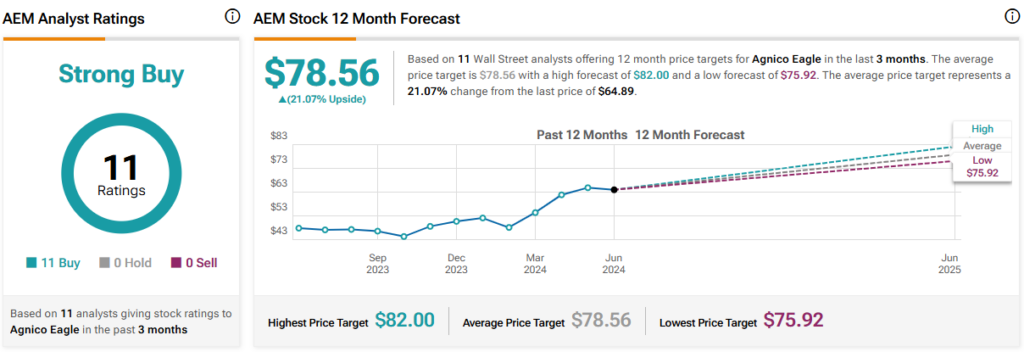At first glance, gold mining enterprise Agnico Eagle Mines (NYSE:AEM) receiving several Buy ratings recently from Wall Street analysts seems unusual. Basically, the Federal Reserve appears reluctant to lower interest rates, not with another resounding jobs report in the books. However, the optimism for AEM stock actually makes sense. You just have to consider the underlying economic nuances.
It’s a tricky narrative, to be sure. One of the drivers of commodities-based enterprises is monetary policy. Since core goods are priced in dollars, when the Fed implements an accommodative (dovish) policy, the action implies a devaluation of the dollar. Subsequently, physical assets priced in dollar terms (like gold) should rise.
In contrast, when interest rates rise under a hawkish framework, the dollar becomes relatively more valuable. Commodities, in turn, become less so, thus being bearish for gold. It’s a simple calculus. However, the assumption that the Fed is dead set on keeping rates elevated could be incorrect. Ultimately, the contrarian argument holds some water, and that may bode well for precious metals. Therefore, I am bullish on AEM stock.
Recent Analyst Ratings Raise Eyebrows for AEM Stock
It’s not just that AEM stock received one bullish endorsement. On Friday, Agnico Eagle got the green light from three experts representing CIBC (NYSE:CM), Bank of America (NYSE:BAC) Securities, and Scotiabank (NYSE:BNS). The expected per-share price target among the three analysts ranges between $81 to $82, implying between 24% and 26% upside potential.
What’s more enticing is that the expert opinions are not outliers. Currently, the assessment for AEM stock stands as a unanimous Strong Buy. Obviously, that’s high praise. At the same time, the rating seems aggressively optimistic.
As TipRanks reporter Radhika Saraogi mentioned earlier this month, May’s nonfarm payrolls data revealed that employers added 272,000 jobs. This figure represented a significant lift from the prior month’s tally of over 165,000. Further, the latest print jumped well above the 182,000 jobs that economists previously anticipated.
Generally, a society strives for a robust labor market. However, the case for the U.S. is a bit nuanced because of the underlying inflation problem. Essentially, the strong jobs report has become a case of good news being bad news.
As Saraogi mentioned, the disclosure “sparked some minor pessimism among investors because it could potentially sway the Federal Reserve to wait longer before cutting interest rates. Indeed, the market-implied probability of a rate cut in September decreased from 55% yesterday to 45% today, according to the CME FedWatch Tool.”
Why a Dovish Policy Isn’t Impossible
With the jobs report coming in so hot, more money is chasing after fewer goods. That’s inflationary, and so the consensus view that the Fed won’t cut rates anytime soon appears to be correct. Nevertheless, it’s vital to keep an open mind.
As TipRanks reporter Paul Hoffman stated, the domestic economy gives the impression that it’s running on all cylinders. However, not everyone shares the optimistic view because, in Hoffman’s words, “there is a mixed view between economic indicators and public sentiment.”
One piece of evidence that the expert brought to the table is the juxtaposition between robust job growth and weak economic reports. Hoffman cited soft income and spending data for April. In addition, he mentioned a “lower-than-expected manufacturing sentiment reading in May.”
Moreover, companies have issued warnings about eroding consumer spending. Couple this dynamic with ongoing mass layoffs in the technology sector and other industries, and the economic picture becomes much more cloudy.
In other words, the headline figures suggest that everything is perfectly fine with the economy. If anything, job growth appears too hot, and therefore, a hawkish policy might be in order. However, the granularity suggests that many sectors actually need help. If so, a dovish monetary policy that materializes sooner than expected wouldn’t be out of the question.
More Than Just an Inflation Problem
Ultimately, the Fed might be inclined to do the seemingly unthinkable and lower interest rates this summer. The central bank can’t just think about inflation. It must also factor in long-term economic stability. What’s problematic right now is that the unemployment rate for young workers ages 20 to 24 is rising uncomfortably.
In February 2020, this statistic was only 6.5%. As of the latest read (May 2024), the metric jumped to 7.9%. Part of the problem here is underlying business sentiment. With interest rates so high, enterprises have less reason to take additional risks (that is, hiring new workers). Instead, it’s incentivized to save money, leading to actions such as layoffs.
In my opinion, Wall Street analysts understand this dynamic. That’s probably why they rate AEM stock so highly. Moreover, the possibility of a surprise rate cut could indirectly boost gold prices. In turn, that could have a positive effect on Agnico’s earnings and revenue projections.
As a consensus, experts believe the company’s earnings per share can rise 40.4% to $3.13, while the top line could pop 16% to hit $7.69 billion. Indeed, if a Fed stunner materializes, the most optimistic forecast of EPS of $3.78 on revenue of $8.21 billion could be achievable.
Is Agnico Eagle Mines Stock a Buy, According to Analysts?
Turning to Wall Street, AEM stock has a Strong Buy consensus rating based on 11 Buys, no Holds, and zero Sell ratings. The average AEM stock price target is $78.56, implying 21.1% upside potential.

The Takeaway: AEM Stock May be Operating on the Wrong Assumption
Based on the headline jobs numbers, the robust growth makes it appear that inflation remains the economy’s number one challenge. Therefore, many, if not most, economists believe that the Federal Reserve will not lower interest rates. However, a deeper look into the nuances reveals segments that are really struggling. It’s not impossible, then, for the Fed to reduce rates. In turn, that could be resoundingly positive for gold mining stock AEM.



















